Legal questions raised following minaret vote
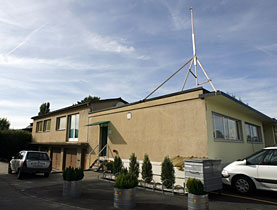
After Switzerland's vote to ban the construction of minarets, a plan to build such a tower in the town of Langenthal could provoke an international conflict.
One possible scenario is that the European Court of Justice (ECJ) could force Switzerland to lift the ban, with Langenthal being a test case.
The Muslims of Langenthal are standing behind their minaret plans, despite Sunday’s vote. “We will fight, if necessary before the Federal Court in Lausanne or in Strasbourg,” commented local Muslim leader Mutalip Karaademi.
Local minaret opponents, however, consider this as a plan that’s being forced on them and say the construction of the minaret would constitute “Islamic power expansion”.
For most legal experts, the case is clear: The minaret ban runs contrary to the European Convention on Human Rights. It contravenes both the clause in the convention on the prohibition of discrimination and the guarantee of religious freedom.
“There is hardly an objective reason why the minaret ban can stand up against the convention,” Rainer Schweizer, a professor of criminal law at St Gallen University, told swissinfo.ch.
That means that the ECJ in Strasbourg could one day severely reprimand Switzerland and force it to withdraw the minaret ban, which is now anchored in the Swiss constitution.
Such a change of the Swiss constitution would have to be accepted by a vote and that would very probably lead to a politically crucial nationwide test.
Religious freedom
The local Islamic community – 130 members from Macedonia, Albania and Kosovo – handed in plans to renovate their meeting place in 2006, which included construction of a six-metre-high minaret.
The project has since been an issue for both planning and cantonal authorities. After the town’s authorities gave planning permission, protests were lodged; a revised project was put forward and once again there were objections. It’s now in the hands of the cantonal authorities.
After the approval of the minaret ban on Sunday, the future of construction is unclear. The question is whether the Langenthal minaret falls under the ban or not. Justice Minister Eveline Widmer-Schlumpf says the situation is unclear because the local authorities had already approved it twice.
Schweizer told swissinfo.ch he does not exclude the possibility that the minaret plan falls under Bernese legislation, which stipulates that the law in force on the day of the planning application applies.
“Complex case”
The president of the European Court of Human Rights, Jean-Paul Costa, has described the minaret ban as a “complex case” and said that it was unlikely that an appeal against the result would end up before the court.
Costa noted that it was not clear who would bring the case to the Strasbourg court because they would have to be a direct victim of the ban.
The rightwing Swiss People’s has already said that if the Strasbourg court turns against Switzerland, Bern should pull out of the human rights convention.
According to the leading supporter of the initiative to ban minarets, Ulrich Schlüer of the People’s Party, Switzerland also has to be prepared to be thrown out of the Council of Europe.
If this were the case, Switzerland would be “totally isolated”, according to constitutional law expert Jörg Paul Müller.
But Swiss legal scholar and professor Walter Kälin, feels Switzerland would not want to abandon the convention on account of the minaret issue.
Foreign Minister Micheline Calmy-Rey has also said that terminating international treaties is no option: “Building a wall behind our mountains cannot be a solution.”
The Muslim community accounts for about 4.5% of the Swiss population.
Most Muslims resident in Switzerland come from countries of the former Yugoslavia and Turkey. The majority are moderate Sunnis.
There are an estimated 200 mosques and prayer rooms in Switzerland, but only four have a minaret.
Switzerland is the first European country that has forbidden the construction of minarets.
On November 29, 57.5% of voters were in favour of a people’s initiative that said quite simply: Against the construction of minarets.
Several plans for the construction of minarets in the German-speaking part of Switzerland were the catalyst for the initiative. Local residents collected signatures against the planned towers.
They were supported by the rightwing Swiss People’s Party and the Federal Democratic Union, which coordinated efforts.
(Adapted from German by Robert Brookes)

In compliance with the JTI standards
More: SWI swissinfo.ch certified by the Journalism Trust Initiative

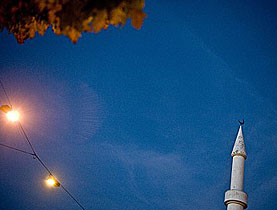
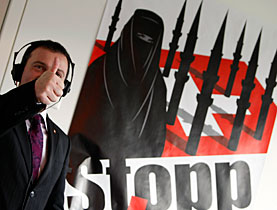
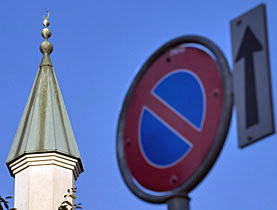
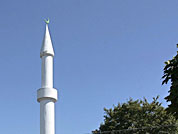
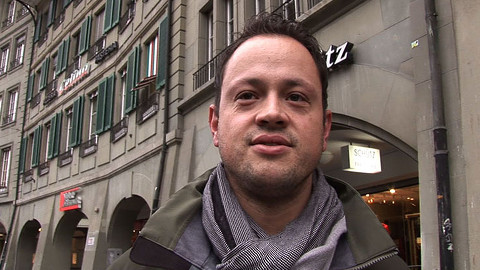
You can find an overview of ongoing debates with our journalists here. Please join us!
If you want to start a conversation about a topic raised in this article or want to report factual errors, email us at english@swissinfo.ch.